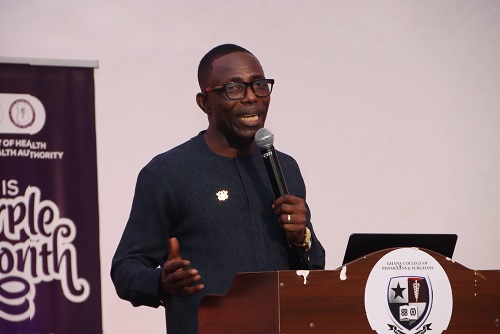The Director of the Centre of Aging Studies at the University of Ghana, Prof. Joseph Osafo, has advocated a stronger partnership between religious institutions and mental health service providers in the country.
He said such a collaboration could help address mental health challenges and reduce the stigma associated with mental illness.
The director underscored the critical role religious organisations played in society, saying, they were a potential force for positive change in mental health care.
“In a country where a significant portion of the population looks to religious leaders for guidance, these institutions are well positioned to raise awareness, offer support and connect individuals with professional mental health service providers,” Prof. Osafo added.
He was speaking at a lecture on mental health in Accra last Wednesday to honour Prof. E.F.B. Forster, a man described by many as the patriarch of psychology in the country.
The lecture, which was the second edition, was organised by the Mental Health Authority on the theme: “Religious groups and the state of mental health care in Ghana.”
Misconceptions
Prof. Osafo mentioned misconceptions about mental illnesses, which, he said, were often attributed to spiritual attacks, leading to victims seeking deliverance or exorcism instead of going to hospital for treatment.
![]()
He, therefore, encouraged religious leaders to consider mental health as a serious concern and integrate faith with modern psychology to support victims in their recovery process.
Capacity-building
Prof. Osafo further recommended that religious leaders be given training in mental health literacy to enable them to identify signs of mental illness and also provide mentel health patients with initial counselling before referring them to professionals.
“We must empower religious leaders as frontline advocates to educate and demystify mental health issues within their congregations,” he said.
In line with that, Prof. Osafo urged the government to formally include religious institutions in its mental health strategy, particularly in underserved communities where faith-based organisations often had more reach than health facilities.
Such partnerships, he said, could involve setting up community outreach programmes led by religious leaders to offer education and support for mental health.
Prof. Osafo also said that the involvement of religious groups could serve as a tool to combat stigma, as faith-based leaders possessed significant influence in shaping societal attitudes.
He admonished religious bodies to embrace mental health as part of their ministries, and also prioritise the well-being of their congregants.
“When religious leaders, mental health professionals and the government work together, we can create a more compassionate, inclusive and supportive society,” he stated.

